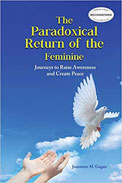
 |
The Paradoxical Return of the Feminine: Journeys to Raise Awareness and Create Peace
by Jeannette M. Gagan, PhD
Rio Chama Publications
Though in her eighties—and proud of it—author Gagan insists that it is never too late to “emotionally and spiritually mature.” Her insightful book is a testament to that truth. The notion of feminine energy, which serves as foundational in this treatment on well-being and peaceful awareness, primarily concerns the following five attributes: grounding oneself, social relatedness, nurturing of self and others, creativity, and self-knowledge. Importantly, both males and females are capable of possessing the energy of femininity. While such characteristics may present themselves more naturally in women, posits Gagan, men are just as capable of embracing these qualities. In fact, all of society benefits from a balancing of both feminine and masculine energies from both sexes.
Weaving throughout the book her own life experiences (including having been sexually and emotionally abused as a child and dealing with often-debilitating PTSD and obsessive-compulsive behaviors), the author, with that emphasis of feminine energy at the forefront, provides analysis on many fronts which relate to wholeness, peace, and emotional well-being. Among them, Gagan explores a variety of healing modalities (such as shamanism, brain dynamics, massage therapy and bodywork, and biofeedback), a restoration of the power of the feminine in society, and characteristics of a goddess (including women as peace ambassadors). The author discusses that which she describes as “scientific and non-scientific paths to bring out the goddess in you.” Chiefly, this includes therapy, self-help (such as proactive research), and altered states of consciousness (including dreaming, hypnotization, meditation, and relaxation techniques). Her book also includes modalities which she acknowledges are often regarded as being out of the mainstream, such as numerology, astrology, consultation of the I Ching, use of runes and oracles, and tarot readings.
Emphasis is placed on the establishment of a healthy, trusting, open relationship between therapist or other practitioner and oneself when it comes to any of the endeavors mentioned above. Similarly, with an entire chapter devoted to mentors, Gagan stresses the importance of seeking out individuals who embrace a “nurturing, accepting environment that helps us grow.” Negativity and unhealthy relationships she terms as “non-mentors.” Further, feminine energy in relationships (primarily that of marriage) and sexuality as being a sacred phenomenon are examined at length, including a variety of meditative and spiritual practices that can enhance sexual connection.
Gagan’s work encompasses an impressive range of material drawn from intriguing bodies of knowledge and philosophies—both Eastern and Western in origin—and succeeds in making strong connections between these and her central focus of feminine energy. Furthermore, this is accomplished in a highly creative and seemingly quite natural writing style, which blends the author’s decades of anecdotal experiences and observations beautifully into the equation. The author is obviously a lover of peace and justice, both at the personal level and indeed on a grand, worldly scale, and one can feel the warmth, the love, and the deep thirst for humanity’s well-being throughout these pages. Admirable as well is that the reader will find absolutely no “male-bashing,” for lack of better descriptor. Rather, as alluded to previously, a balance of the masculine and the feminine is sought.
Throughout much of history, the role, range, and acceptance of femininity has often been strictly defined and limited. Thus, the importance of books such as this—which is Gagan’s third in a trio of works examining the relationships between spirituality, transformation, and what might be described as the psychology of celebrating the self—is obvious. A licensed psychologist and a registered nurse who grew up in a devout Catholic family, the author says she was exposed to more liberal points of view during her studies, and that has informed her professional work and activism. In light of her past traumas and struggles of a psychological nature (which at one point resulted in having to close down her therapeutic practice), she points out often that if an octogenarian such as she can grow and heal, then so can anybody.
RECOMMENDED by the US Review